Technology vs Infectious Diseases: An Imperial College / Royal Institution Summit
In today’s globalised world, the increased movement of people, the expansion of international trade in foodstuffs, not to mention growing antimicrobial resistance, mean that the dangers posed by infectious diseases have never been greater. Infectious diseases are now spreading geographically much faster than at any time in history and there are now nearly 40 diseases that were unknown a generation ago. In addition, during the last five years, the World Health Organisation has verified more than 1,100 epidemic events worldwide. However, some of the smartest minds in industry, academia and charities are consolidating their efforts into tackling this key global challenge.
On the 26th September at The Royal Institution in Mayfair, the Technology vs Infectious Diseases Summit revealed how the best in UK research and technology is helping to combat bacterial, viral, parasitic and fungal diseases. The Summit included British industry, academia, NGOs and young entrepreneurs, showcasing the worldwide contribution of UK research in this area and its collaborations with developing countries.
The afternoon started with a welcome from Professor Gail Cardew, Director of Science and Education at the Royal Institution and an introduction by Professor James Stirling, Imperial College Provost. The first session, chaired by Professor Alison Holmes, started with a focus on Global Infection threats, with presentations covering innovative technology for the management and control of dengue by Dr Jesus Rodrigues Manzano and Dr Sophie Yacoub, an inter-disciplinary approach for malaria eradication by Professor Jake Baum and how the global emergence of antimicrobial resistance in pathogenic fungi is being recognised as a major driver for infectious diseases mortality by Dr Darius Armstrong-James. Following these presentations, Professor Robin Shattock gave us an overview on “‘Vaccines vs infection’: old foes, emerging threats and changing populations” and closing the first session we were delighted to have a presentation by Dr Emmanuel Hanon, Global Head of GSK Vaccine Research and Development on the emerging complex needs regarding vaccines and most recent advances in vaccine technology platforms such as the vision for the SAM vaccine rapid response platform or a new class of vaccines, that rely on a different way to mimic infection and can offer faster, cheaper and unique multipurpose production like “RNA vaccines”.
The second session, chaired by Dr Pantelis Georgiou, focused on the challenges of bacterial infections and what technology can do to tackle this issue. To kick-start this session we were introduced to DNA sequencing-based tests that can rapidly provide accurate diagnostic information on infectious diseases by Professor Chris Toumazou, Regius Professor of Engineering at Imperial and also Ri Trustee and Founder and Executive Chairman of DNAe and Mr David Davidson, Chief Scientific Officer from DNA Electronics ltd. Following this, we had a presentation on machine learning and biosensor technology to improve the precision of antibiotic management by Dr Danny O’Hare and Dr Tim Rawson. This session then moved on to a talk about “Serious games: a new ‘tablet’ against drug-resistant infections” using a software that uses psychological techniques in games to optimise prescriber behaviours in hospitals, developed by Dr Enrique Castro Sánchez and Mr Jamie Firth. The session finished with a presentation on early detection of antimicrobial resistance using rapid evaporative ionisation MS (REIMS) in the diagnostic laboratory and livestock infection, by Dr Fankie Bolt and Dr Simon Cameron.
Following the afternoon presentations, the audience enjoyed a showcase of technologies that included ProMED, an Internet-based reporting system dedicated to rapid global dissemination of information on outbreaks of infectious diseases; POCAST and Target, facilitating navigation, access and use of national antimicrobial guidelines to support clinical prescribing decisions; and Microreact, open data visualisation and sharing for genomic epidemiology. Also among the technology on display at the Ri was DNA Electronics ltd LiDia BSI Test for diagnosis of bloodstream infections that lead to sepsis, which was unveiled for the first time and EPIC IMPOC an NIHR i4i funded project which aims to develop an intelligent clinical decision support system to help doctors prescribe the most appropriate antibiotics. We also welcome at the showcase of technologies the Centre for Genomic Pathogen Surveillance (CGPS), a joint initiative between Imperial College London and the Wellcome Genome Campus that aims to understand the emergence and spread of drug resistance pathogens and use whole genome sequencing for its global surveillance, providing at the same time actionable data. Also present was the BBC Pandemic team explaining how their APP could be key in preparing for the next pandemic outbreak. After presenting in the second session, Dr Enrique Castro Sánchez and Mr Jamie Firth also showcased their ‘tablet’ game against drug-resistant infections and Dr Darius Armstrong-James presented us with a small scale fungorium.
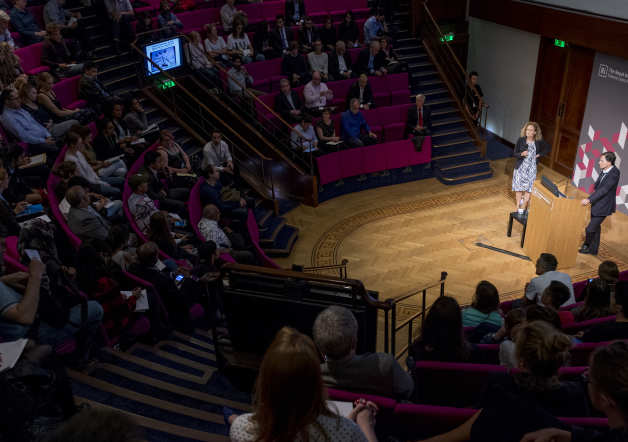
The evening was hosted by Sir Richard Sykes, Chair of the Royal Institution and former Rector of Imperial College, and featured a keynote address by Professor David Heymann Head of the Centre on Global Health Security at Chatham House, on “Global Infectious Diseases: Priorities for action”.
With the unprecedented growth of newly emerging diseases and the live threat of infectious diseases spreading rapidly at a global level, the critical debate through the public communication of science is even more paramount. This summit at the Ri, a place where cutting-edge science has been announced, debated and showcased to the world for over 200 years, is a reminder that the research in science and technology carried out in this country has a major role in the fight against global infectious diseases and drug resistant infections.
Download the day's programme here
Imperial College news and events coverage
"Tackling the Global Challenge of Antimicrobial Resistance" an EMBRACE Workshop and Dragons Den Competition
The EMBRACE Workshop focused on the challenges we are facing in antimicrobial resistance (AMR), and how multidisciplinary research spanning Engineering, Medicine, Physical and Natural Sciences can help solve this problem. Attendees became familiarised with some of the challenges in AMR through a series of presentations by the EMBRACE Pump Priming and Sandpit awardees. Following these presentations, we hosted a Dragons’ Den Competition where challengers pitched to a panel of experts how their research could tackle the challenge of AMR. The afternoon closed with a networking BBQ event where attendees had the opportunity to interact with our cohort of experienced multidisciplinary researchers working in the field of AMR.
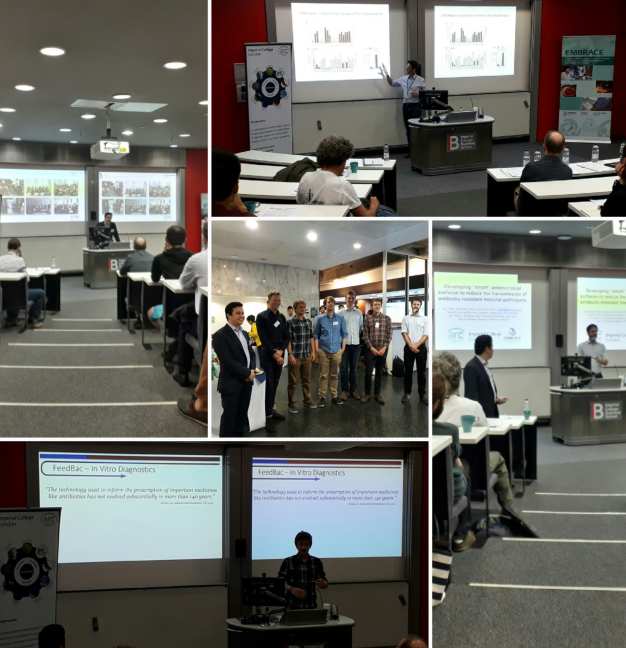 The first session of the afternoon focused on the EMBRACE Pump Priming and Sandpit awarded projects and their progress to date. The following Sandpit and Pump Priming awardees were present: Promoting Immune Clearance of Bacterial Pathogens, Dr Andrew Edwards; Rapid Evaporative Ionisation Mass Spectrometry for Early Detection of Antimicrobial Resistance, Dr Simon Cameron; Antimicrobial Resistance in Gut Communities, Dr Lesley Hoyles; LIPID-MINDS: Lipid Mapping to Identify Novel Drug Solutions, Dr Gerald Larrouy-Maumus; Real-time Enhanced Antimicrobial ConTroller (REACT), Dr Pau Herrero-Viñas.
The first session of the afternoon focused on the EMBRACE Pump Priming and Sandpit awarded projects and their progress to date. The following Sandpit and Pump Priming awardees were present: Promoting Immune Clearance of Bacterial Pathogens, Dr Andrew Edwards; Rapid Evaporative Ionisation Mass Spectrometry for Early Detection of Antimicrobial Resistance, Dr Simon Cameron; Antimicrobial Resistance in Gut Communities, Dr Lesley Hoyles; LIPID-MINDS: Lipid Mapping to Identify Novel Drug Solutions, Dr Gerald Larrouy-Maumus; Real-time Enhanced Antimicrobial ConTroller (REACT), Dr Pau Herrero-Viñas.
Our Dragons Den competition closed the afternoon session. We invited PhD students and early career post-doctoral researchers, either as individuals or groups, to give a 5 minute “Dragons’ Den” style pitch to a panel of experts as to how their research can contribute to addressing the challenge of AMR. Dr Pantelis Georgiou (Department of Engineering) chaired the competition, and our ‘Dragons’ were Professor Alison Holmes (Department of Medicine), Professor Alan Armstrong (Department of Chemistry), Professor Sivaramesh Wigneshweraraj (Department of Medicine), and Jon Wilkinson, our guest from Imperial Innovations. Seven groups were shortlisted to present at the ‘den’ to an audience of more than 60 researchers and students. Two prizes of £1000 were awarded to the winners to kick-start and support their projects, which will also receive mentorship from world experts in the field towards implementing their idea and furthering their career through potential applications for funding. The winners were Jon Otter with the project entitled "Developing “smart” antimicrobial surfaces to reduce the transmission of antibiotic-resistant hospital pathogens" and team FeedBacUK, which proposed a colour changing test for specific pathogenic bacteria that is fast, affordable and simple to use.
The aim of this workshop was to bring together researchers and students and share results of current AMR research from the EMBRACE Pump Priming and Sandpit awarded projects. The afternoon was highly successful in fulfilling its aims of engaging the next generation of scientists on how their research can be used tackle the challenge of AMR.
EMBRACE @ SuperBug Zone, Imperial Festival 2017
EMBRACE joined the Antimicrobial Research Collaborative (ARC) in the superbug zone for the second year running, teaming up with students, post-docs and staff to highlight the problem of antimicrobial resistance.
Visitors were invited to play the role of the “Infection Investigator” in an interactive game designed to help them understand the fight against superbugs, and to represent how the three Faculties (Medicine, Engineering and Natural Sciences) involved in the EMBRACE program are combining to tackle problems associated with AMR.
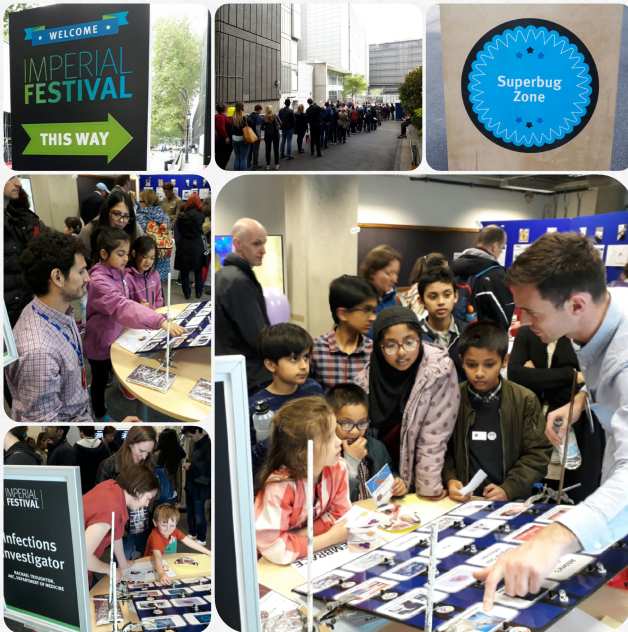 The game provided players visual real-time feedback on their decisions and increased awareness of the different types of infection. It took participants on a journey from spotting infection symptoms, to where to seek appropriate healthcare, to the name of the disease and the pathogen responsible from a list of three that are responsible for many common infections (viruses, bacteria and fungi) ending with the appropriate treatments. Information on the differences between these microorganisms was also provided. The game proved to be extremely popular, especially among children and young students since it was designed to be played as a team. The EMBRACE Fellows focused on discussing important points, such as recognising that flu is caused by a virus and as a result is not susceptible to antibiotic treatment.
The game provided players visual real-time feedback on their decisions and increased awareness of the different types of infection. It took participants on a journey from spotting infection symptoms, to where to seek appropriate healthcare, to the name of the disease and the pathogen responsible from a list of three that are responsible for many common infections (viruses, bacteria and fungi) ending with the appropriate treatments. Information on the differences between these microorganisms was also provided. The game proved to be extremely popular, especially among children and young students since it was designed to be played as a team. The EMBRACE Fellows focused on discussing important points, such as recognising that flu is caused by a virus and as a result is not susceptible to antibiotic treatment.
The Superbug Zone was one of the most popular venues on Imperial Festival 2017. Visitors said they enjoyed the simple and fun way the science was explained, enabling children and young students to understand and feel engaged with the exhibitions. This event gave our fellows a unique opportunity to engage with the general public, bringing visibility to the research being done in AMR at the Imperial College, and also providing children and young students with ‘role models’ in science.
EMBRACE special seminar
The 9th EPSRC EMBRACE seminar on the 14th March was a great success, with three exciting speakers and a full multidisciplinary audience including attendees from Chemistry, Engineering, and Medicine. The afternoon’s presenters included Dr Avinash R. Shenoy, Non-Clinical Lecturer in Molecular Microbiology, Professor Jackie Hunter, CEO of BenevolentBio and former CEO of the Biotechnology and Biological Sciences Research Council, and closing the afternoon was Richard Compton, General Manager at Metrichor.
The seminar commenced with a presentation by Dr. Avinash Shenoy on “Caspase targets in host immunity to infection” and how the identification of new proteins within the host could be exploited in our fight against bacterial infections. Avinash’s presentation focused on research currently being carried out at Imperial College within the field of AMR.
The afternoon followed on with a talk by Professor Jackie Hunter on “AI and Biomedicine: Culture clash or marriage made in heaven”. Professor Hunter introduced the problem of drug development costs and length, stressing that it can take over a decade and over two billion dollars to introduce a new medicine to the market. This can be a serious threat when fighting infectious diseases, in particular in the field of AMR. Thus, to have a sustainable and innovative industry capable of fighting this threat, it is imperative to reduce costs and improve success rates on developing new medicines. Jackie firmly believes that AI and machine learning technology have the potential to increase productivity of new pharma, changing the way we discover new drugs. Also highlighted was the importance of collaboration and knowledge sharing in order to rapidly progress this research field.
Our last speaker, Richard Compton, spiked the audience’s curiosity with an engaging introduction to “Nanopore Sequencing, with a focus on Infectious Diseases”. With so many recent technological advances in medical informatics, biomedical engineering and biomedicine, we have developed complex biomedical systems including innovative clinical and computer-based decision support systems. Richard’s introduction to nanopore sequencing showed us how this technology is designed, allowing the user to digitise a biological sample and stream data for real time analysis with little or no laboratory infrastructure and share the results with other professionals, such as scientists, organisations, or healthcare professionals.
The aim of this rich and multidisciplinary seminar was to bring together researchers and industry practitioners to share results of current AMR R&D. Some important questions were raised on the success rates of developing new medicines and how DNA sequencing and proteins can help us find solutions to deal with AMR in the rapidly evolving arena of “Tech vs infectious diseases”.
World Antibiotic Awareness Week
On 18th November 2016, EMBRACE organised its first joint seminar with SurreyCHAIR, associating the event with the World Antibiotic Awareness Week, raising awareness as well as funds with the Great British Tea Party.
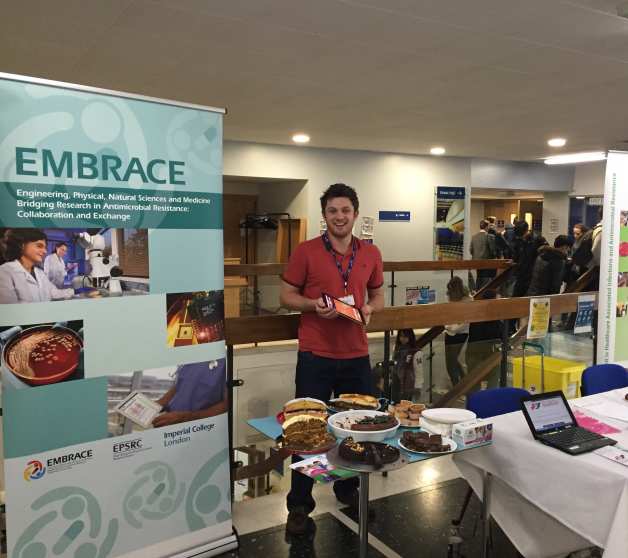 The guest reader was Professor Alasdair “Alex” Cook who is a veterinary epidemiologist with more than 25 years national and international experience in livestock animal health in Government, academic and development environments. Alex is a firm believer in a multi-disciplinary team approach to research, engaging with molecular biologists, microbiologists and socio-economists to name but a few. This idea brought both groups together and further collaboration is planned with a joint data visualisation workshop as well as a series of seminars/workshops on drug detection technology and devices; longitudinal study on education and AMR stewardship and economics and prescribing.
The guest reader was Professor Alasdair “Alex” Cook who is a veterinary epidemiologist with more than 25 years national and international experience in livestock animal health in Government, academic and development environments. Alex is a firm believer in a multi-disciplinary team approach to research, engaging with molecular biologists, microbiologists and socio-economists to name but a few. This idea brought both groups together and further collaboration is planned with a joint data visualisation workshop as well as a series of seminars/workshops on drug detection technology and devices; longitudinal study on education and AMR stewardship and economics and prescribing.
Our second reader of the day was Caroline Colijn on “Bacterial Olympics: Competition and resistance”. She works with a broad aim to develop the mathematical tools to connect sequence data for pathogens to pathogen ecology. Caroline also has a long-standing interest on the dynamics of diverse interacting pathogens. Her group is building new approaches to analysing phylogenetic trees derived from pathogen sequence data, studying tree space and branching processes, and doing ecological and epidemiological modelling.
After the presentations the attendees stayed for our charity bake sale and coffee morning, part of the Great British Tea Party organised to help Antibiotic Research UK to raise valuable funds for research, education and patient support. We managed to raise over £120 and sold delicious cakes made for the event by members from our team.
The morning was highly successful in fulfilling our aims of raising awareness and funds to the World Antibiotic Awareness Week and also engaging with researchers from Surrey School of Veterinary Medicine, following an earlier meeting in July.
Imperial’s ARC & EMBRACE collaborations joined forces with the School of Public Health to deliver a day with a focus on AMR in the context of global health
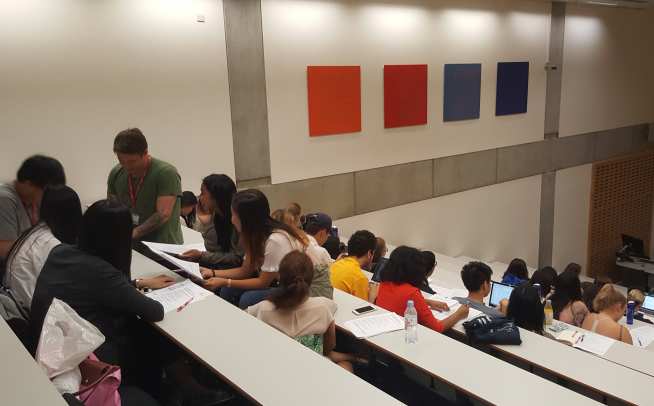
The 2016 Faculty of Medicine Summer School, Revolutions in Biomedicine, brought together bioscience and medical students from all over the world. Through lectures, interactive group work and laboratory research projects they covered topics as diverse and wide-ranging as stress to big data. On the penultimate day of the school, the EMBRACE team joined forces with Dr Mariam Sbaiti from the School of Public Health to deliver a day on Antimicrobial Resistance & Global Health.
The day commenced with an introduction to antimicrobial resistance (AMR) from Dr Maryam Modarai (EMBRACE fellow, department of Medicine). This charted the discovery and widespread implementation of antibiotics to treat bacterial infections (a true revolution in biomedicine!), the emergence of resistance infection and the mechanisms by which they arise, and the potential post-antibiotic era that we face today. This was followed by two research talks from Imperial’s Antimicrobial Resistance Collaborative (ARC) fellows, Dr Martina Valentini and Dr Myrsini Kaforou. Both talks focused on specific areas of research within the field of AMR that are currently being undertaken at Imperial College, introducing the students to current research topics and giving insight into the world of biomedical research.
Dr Martina Valentini outlined how biofilm formation promotes the emergence of bacterial resistance and how this is a significant problem in areas such as hospital-acquired infections and lung infections in Cystic Fibrosis patients. Martina also discussed how understanding the mechanisms involved in biofilm development better could lead to the development of novel approaches to combating bacterial biofilms. Dr Myrsini Kaforou talked about the need for quicker and more reliable methods of diagnosing Tuberculosis (TB) infections. Tuberculosis affects an estimated 1 in 3 of the world’s population and the incidence of drug-resistant TB is an increasing problem. Myrsini described her research into developing a new diagnostic technique using genetic biomarkers to develop a “signature” of TB infection with the aim of producing a method of diagnosis that is both more specific and sensitive than those currently used.
The three presentations were followed by a stimulating panel discussion with the speakers as well as Dr Mariam Sbaiti and Dr Lindsay Evans (EMBRACE fellow, department of Chemistry). This gave the students an opportunity to ask questions about AMR in the broader context and promoted discussions between the panel and students. Important topics such as the economic reasons behind the lack of new antibiotics coming to market in the last 30 years, the effects of unregulated antibiotic use, and why bacteriophages, which are a popular alternative to antibiotics in countries such as Russia, are not used worldwide were discussed.
The afternoon session explored AMR in the context of global health. Dr Mariam Sbaiti worked with Dr Lindsay Evans to deliver a team-based learning exercise linking the two research themes. Dr Sbaiti then delivered a lecture introducing the audience to the field of global health, using drug-resistant TB to exemplify the complex problems and multifaceted causes of global health issues. The day concluded with an interactive summary session where the students were asked to summarise the key learning outcomes from the day and how factors associated with AMR and global health interplay.
The day was highly successful in fulfilling its aims of engaging the next generation of scientists and medics on the threat of AMR and the complex problems that feed into global health issues. The students particularly enjoyed hearing about the cutting-edge research at Imperial College and the opportunity for discussion with people working in these important research areas. This event was also a fantastic opportunity for those involved in the day, giving experience of collaborating with multiple departments to deliver a focused day of interdisciplinary teaching.
EMBRACE Sandpit (7-8 July 2016)
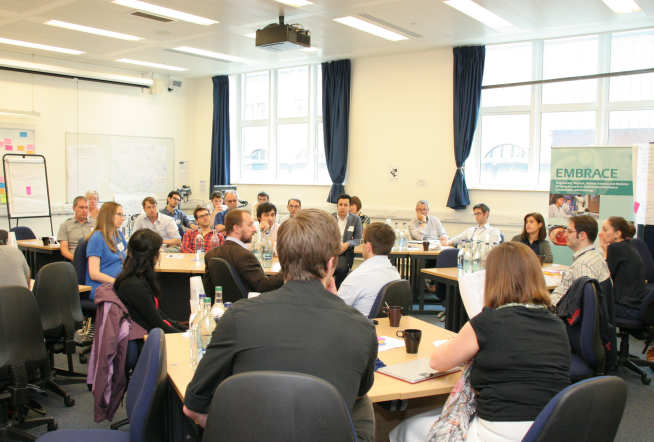
On 7 -8 July 2016, over 30 investigators from Imperial College and Universities of Newcastle, Surrey and Warwick gathered at South Kensington Campus to participate at the first EPSRC-supported EMBRACE Sandpit to propose innovative solutions to address the antimicrobial resistance (AMR) challenge.
The event was conducted by Knowinnovation, a company with more than 10 years of experience of running sandpit events. The four EMBRACE co-PI’s, Professors Chris Toumazou (Engineering), Alison Holmes (Medicine), Alan Armstrong (Natural Science) and Pantelis Georgiou (Engineering) were responsible for stimulating and provoking the participants with short talks and sharp questions. The three EMBRACE fellows, Doctors Lindsay Evans (Natural Science), Maryam Modarai (Medicine) and Pau Herrero (Engineering), were among the participants.
During the first day, several activities involving a lot of creative methods and soapbox talks were conducted in order to get to know each other and get a better picture of the expertise in the room. Lewis Preece from EPSRC gave a talk on the longer term funding opportunities that are on offer, and which could be used to obtain follow-up funding after the sandpit. The day ended with a dinner at 58 Prince's Gate.
The second day of the sandpit was focused on creating multidisciplinary teams of 4-8 participants and writing short, innovative proposals tackling the problem of AMR. At the end of the day, 5 proposals were presented which were evaluated by a panel of experts formed by Professors Alison Holmes, Alan Armstrong, Pantelis Georgiou and Ramesh Wigneshweraraj.
The winning team, led by Dr Andrew Edwards (MRC Centre for Molecular Bacteriology and Infection), was awarded £15K to develop an innovative solution to provide a novel target for a new type of therapeutic that promotes the killing of bacteria by the immune system.
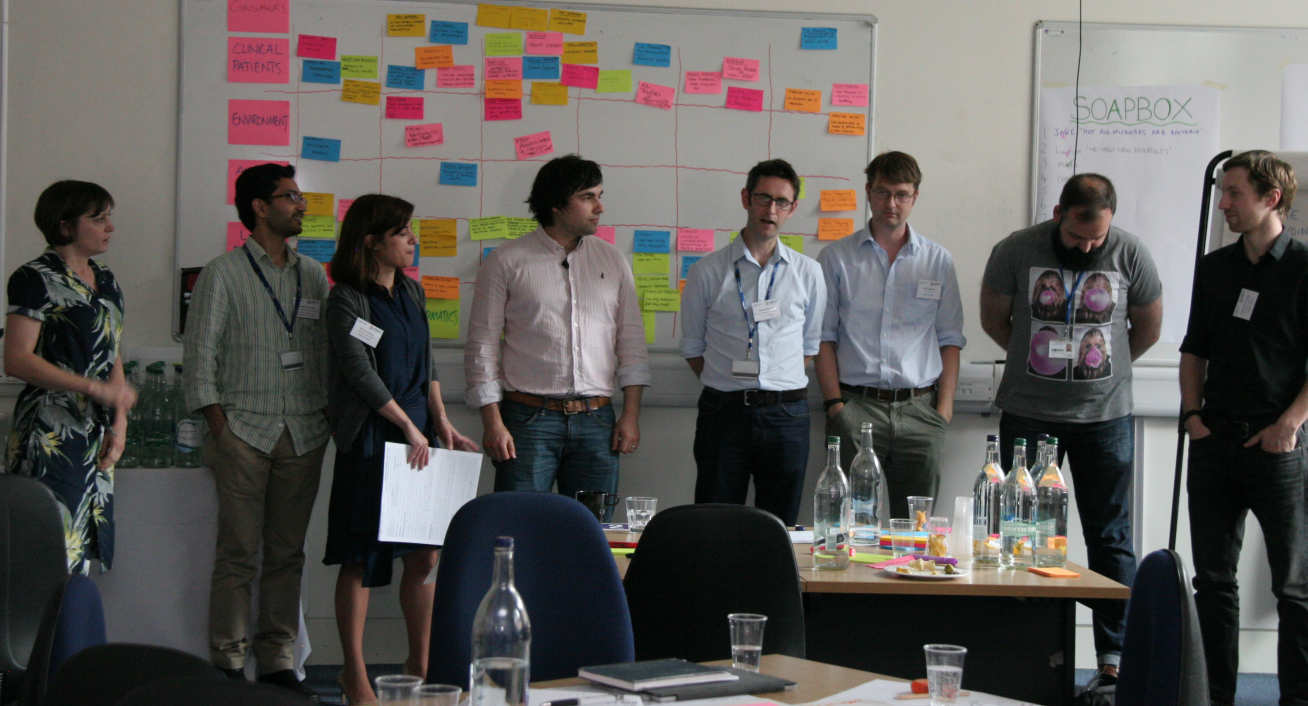
The two days of intensive work and networking brought out great ideas from the participants, some of which will be put forward to the recently announced EMBRACE pump-priming call. The success of the event was enjoyed by everyone present.
EMBRACE @ The Imperial Festival (7-8 May 2016)
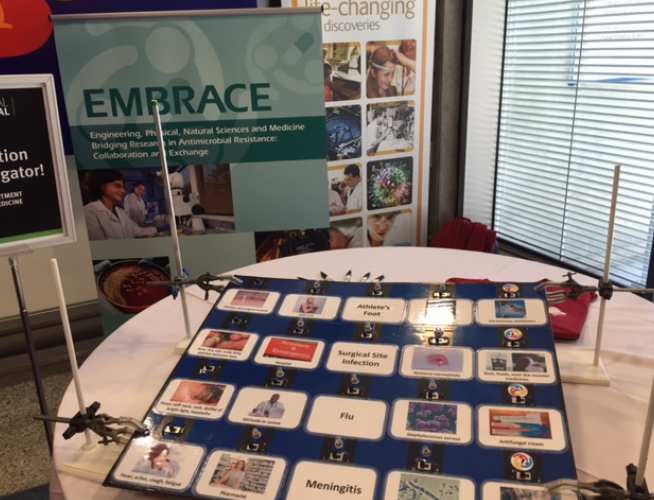
"Infection Investigator" game to show multidisciplinary approach to tackling AMR
This weekend saw the 5th annual Imperial festival welcome thousands of visitors. As the sun poured down, visitors to the South Kensington campus were invited to participate in talks, tours and interactive exhibits.
In the Superbug Zone the EMBRACE team and postgraduate researcher Rachel Troughton ran “Infection Investigator”., an interactive game that took participants on a journey from spotting infection symptoms, to where to seek appropriate healthcare, to the name of the disease, the pathogen responsible and finally what the appropriate treatment for that particular infection was.
Identifying the correct combinations completed electrical circuits to power light bulbs or motors, providing visual real-time feedback on their decisions. The game focused on three different pathogens responsible for many common infections (viruses, bacteria and fungi); fun facts and information on the differences between these microorganisms were also provided.
The game was designed to represent how the three Faculties (Medicine, Engineering and Natural Sciences) involved in the EMBRACE program can combine to tackle problems associated with Antimicrobial Resistance (AMR). Participants had to apply biological information to solve medical questions using engineering solutions, represented by the electrical components to the game.

The game was designed to be played as a team and proved to be extremely popular, especially for families, with around 200 participants over the weekend. The aim of the game was to increase awareness of the different types of infection and what treatments are appropriate for each. Important points of discussion included recognising that flu is caused by a virus and as a result is not susceptible to antibiotic treatment. It is a common misconception that antibiotics can be used to treat viral infections such as colds and flu, and reducing this unnecessary use of antibiotics is an important step in tackling the emergence of antibiotic resistance.
We would like to say a big thank you to Rachel Troughton, Pau Herrero-Vinas, Maryam Modarai and Lindsay Evans for their hard work in developing the exhibit and also to our amazing volunteers Claudia Adele, Michiyo Iwami and Bernard Hernandez Perez for their time over the weekend and their enthusiastic engagement with the public.